To get answers to some of the most common COVID-19 vaccine questions, we went straight to the experts. UHN infectious disease specialist Dr. Abdu Sharkawy, UHN Executive Vice President of Science and Research Dr. Brad Wouters and UHN Medical Director of Infection Prevention and Control Dr. Susy Hota discuss how the vaccine works, how long it takes to develop immunity, how it can help us get back to normal and more.

How do the vaccines work?
“At the end of the day, they all trigger our immune system to make copies of the spike protein. None of them contain the live virus, so they’re not likely to make us sick,” says Dr. Sharkawy.
Pfizer and Moderna vaccines are mRNA vaccines. They hold specific information/instructions that trigger our body to produce antibodies that protect us from the virus if we were to become infected.
AstraZeneca and Johnson & Johnson are viral vector vaccines. Instead of mRNA, these vaccines use a very weak, not live, common virus that helps our body produce necessary antibodies.
What is herd immunity?
Dr. Sharkawy says a virus is able to spread by finding new targets to infect. When enough people in a population (an estimated 75 to 90 per cent) have developed immunity to a virus, that virus can’t easily find a host to infect, which then prevents that person from infecting someone else in the population.
Why do we need to get vaccinated to reach herd immunity?
In normal circumstances, people would fend off the virus on their own and naturally develop immunity. However, Dr. Sharkawy notes, “If we rely on people requiring their own natural immunity, millions of people will die. So, we need help from the vaccine to accelerate our course to herd immunity.”
Why are we hearing some vaccines are more effective than others?
Efficacy rates are different from effectiveness; an efficacy rate represents the amount of reduction in new cases of the disease in the group that received the vaccine in clinical trials versus the group that did not. For example, Pfizer had a 95 per cent efficacy rate, meaning there was a 95 per cent reduction in cases of COVID-19 in the group of people that got the vaccine.
It is important to note that you can still spread the virus even if you are vaccinated.
Dr. Sharkawy says that the differences in the efficacy rates between vaccines are largely based on the chances of you receiving a mild case of COVID-19. All vaccines have proven to be effective in protecting against serious illness.
How long does it take for immunity to kick in after the first shot?
There are a couple of factors. For example, the older you are, the more health conditions you suffer from, the more immunodeficiencies you have – the longer it will take to establish antibodies needed to protect you from the virus. Dr. Sharkawy says that it may be up to two weeks, and in some cases, even three months.
“And that’s why we have to be very careful about not assuming that you can’t get the virus once that needle goes into your arm. You can,” says Dr. Sharkawy, who says we need to be careful about opening up society too quickly in order to let people establish immunity.
The good news is that there is data that shows just one dose of the vaccine can protect people extremely well. Dr. Brad Wouters explains, “it prevents most people from getting infected and will do a lot to help COVID-19 go away.”
Do the vaccines protect against the new COVID-19 variants?
All vaccines have been shown to prevent serious disease from the U.K. variant, B117 (the same strain that caused the third wave in Ontario).
“Overall, I think we’re in good shape in terms of these vaccines providing adequate protection against the variants,” says Dr. Sharkawy. “But the sooner more people get vaccinated and the less virus that’s circulating in our community, the less likely other variants will be able to emerge.”
Is the vaccine safe?
Dr. Sharkawy explains that instead of taking several years to gather the number of people needed for a Phase 3 clinical trial, they were able to get thousands of people from across the globe in months. “They’re generally a diverse group of people,” says Dr. Sharkawy. He explains that the clinical trials were not necessarily as representative of people over the age of 65 in every trial; however, the trials did a good job of getting a wide spectrum of people at a Phase 3 trial level to ensure no rules were broken.
What are the side effects of the vaccine?
“There are side effects, which are common,” says Dr. Susy Hota. “You can feel tired, headachy, even have a fever, have some stomach upset and really just not feel yourself for a few days after getting the vaccine. That’s not a safety issue or a safety signal. It’s expected. It’s your immune system reacting to the vaccine and protecting you from the virus down the road.”
Most minor side effects will go away quickly, but the chances of serious side effects are incredibly rare.
What about the long-term side effects of the vaccine? How can we know it’s safe if it was developed so quickly?
When looking at every vaccine that deployed at a mass scale over the last 150 years, 90 per cent of any serious side effect or concern happened within 45 days of receiving the vaccine. During the trials, scientists waited 60 days until they collected their findings and presented the safety results.
Information compiled from an interview with Dr. Abdu Sharkawy on March 25, 2021, and UHN’s new series, Give it a Shot. Learn more about vaccine safety, side effects, benefits and people’s experiences getting the COVID-19 vaccine here.


